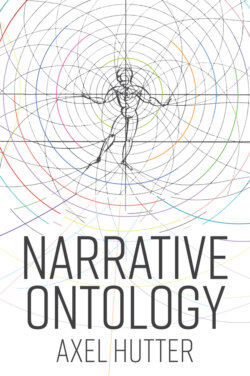Narrative Ontology

Реклама. ООО «ЛитРес», ИНН: 7719571260.
Оглавление
Axel Hutter. Narrative Ontology
CONTENTS
Guide
Pages
Narrative Ontology
Foreword
Preface
The Art of Self-Knowledge
Self-Knowledge
The Intangibility of the I
Who’s Speaking?
Narrative Meaning
Meaning and Being
The Project of a Narrative Ontology
The Truth of Art
Thomas Mann as Model
The Enigma of Human Being
Freedom
Selfhood as Character
Notes
1 The Ambiguity of the I
The Leitmotif
The Original Scene
Readings
The Unrest of the Blessing
Identity of Form and Content
The Narrative Decentring of the I
Coined Archetypes
Isaac’s ‘Blindness’
Selfhood as Self-Understanding
Notes
2 The World Theatre
The Thought-Model of the Actor
The World as Stage
History
Meaning of Life?
The Author as Narrator and Reader
Meaning as Happiness or Happiness as Meaning
Connecting Thoughts
Cain and Abel
The Role of Human Being
The Dignity of Universality
Humanity in Each Person
Notes
3 Narrative Irony
Deception and Disappointment
Leah
Day and Night
Nonsense
Jacob’s Four Deceptions
The Denied Sacrifice
Dialectic of Spiritual Inheritance
Hope
Joseph’s Gift
Mercy of the Last Deception
Notes
4 The Well of the Past
Ontology of Egoism
Self-Respect
Descent into Hell
Wandering
The Abyss of Time
Desperation of Passing Time
Memento Mori
Promise and Expectation
Time that Cannot Be Enumerated
The Feast of the Narrative
Notes
5 How Abraham Discovered God
Where to Begin?
The Adventure of Self-Knowledge
In the Image of God
Self-Knowledge and Knowledge of God
The Courage for Monotheism
Not the Good, but the Whole
God’s History?
Model and Succession
Theology of Narration
Notes
6 What Are Human Beings, that You Are Mindful of Them?
Higher Echelons
Human Reason and Language
Evil
On the Economy of Morality
The Narratable World of What Happens
Who Narrates?
The Novel of the Soul
Very Serious Jokes
In Praise of Transience
Notes
7 The Future
Self-Love
Wit in Language
Ambiguity of the Talent
Knowledge of the Future?
Being on One’s Way
Sympathy
Certainty of Death
The Dreamer of Dreams
The Catastrophe
8 The Dying Grain
The Oracle
The Simile of the Dying Grain
Joseph’s Awakening
Compassion
The Illusory Character of Individuality
The Truth of Illusion
At the Empty Grave
The Other Simile
History in Becoming
Notes
9 Only a Simile
Joseph in Egypt
Historical and Narrative Attentiveness
Laban’s Realm
Huya and Tuya
Egypt as Symbol
The Sphinx
Interpreting Dreams
Pharaoh
Letter and Spirit of Understanding
Interpretation of God
Historical and Narrative Truth
Play and Allusion
Notes
Making Present
Diagnosis of Time
Nihilism as Human Self-Belittlement
Abraham’s Legacy
Notes
References
Index. A
B
C
D
E
F
G
H
I
J
K
L
M
N
O
P
R
S
T
U
V
W
POLITY END USER LICENSE AGREEMENT
Отрывок из книги
Axel Hutter
Translated by Aaron Shoichet
.....
Nietzsche responds by explicitly distancing himself from the distinction between ‘appearance’ and ‘thing in itself’. ‘“Appearance” is a word that contains many temptations, which is why I avoid it as much as possible’ (1990, 86). He understands the distinction between being and meaning instead in terms of language as a difference between dead and living metaphors. Indeed, ‘we believe we know something about the things themselves when we speak of trees, colours, snow, and flowers; and yet we possess nothing but metaphors for things’ (82–3). Being, which, according to common prejudice, is abstractly opposed to meaning and presupposed by it, is thus itself a form of meaning and, indeed, a derivative – more specifically, a dead and ossified – one. The seemingly ‘objective’ being of reality is thus for Nietzsche the essence of those ‘metaphors that have become worn out and have been drained of sensuous force, coins which have lost their embossing and are now considered as metal and no longer as coins’ (84). But, precisely for this reason, the illusion emerges that we are dealing here with ‘objects’ whose being has nothing in common with meaning and language.
Nietzsche opposes this illusion with his own critique of reason as a critique of language that articulates itself as a critical destruction of an ontology of meaningless and speechless being. That which we grasp as the ‘naked’ objectivity of things, preceding the subject and its language and independent of both, turns out to be a product of the subject and its faculty of speech, indeed a product of the mode of forgetting – for the human being, according to Nietzsche, ‘forgets that the original perceptual metaphors are metaphors and takes them to be the things themselves’ (86).
.....